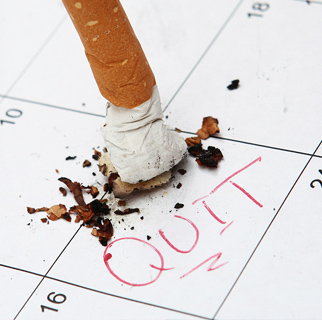How to Quit Smoking, Again

If you're like most smokers who have tried to quit, you may have tried unsuccessfully several times. But you can try again and succeed.
The following advice can help you kick the habit, again, for good.
Understand your relapse
If you relapse, the first thing you should do is not give up. Instead, take stock of the situation. When did the relapse start and what caused it?
Once you understand why it happened, you can begin to think about ways to get back on track.
Here are some steps you can take if you slip and smoke a cigarette:
Recognize that slips happen, but they don't mean that you've failed or that you can't quit for good. Treat the situation like an emergency. Stop smoking immediately! Get rid of all cigarettes.
Make a list of coping strategies sure to work for you this time. Look at those that helped you before you slipped. Forget about those that didn't work for you in the past.
Let family members and friends know that you need their support to stay smoke-free.
Consider using nicotine replacement therapy (NRT). NRT increases your chances of staying smoke-free.
Review your list of reasons for wanting to quit whenever you feel like you're slipping back into your old habit. When the urge hits, say, "I'm going to make it this time."
Call a quit smoking hotline for encouragement. Research has shown that such hotlines really do help people quit. They give them someone to talk with when they get the urge to smoke.
Prevent relapse
One way to head off a relapse is to practice handling some possible situations that might tempt you to smoke, so you'll be prepared for them.
Ask yourself what you should do in these common cases:
You're at a party and a friend offers you your old brand of cigarettes.
You're under a lot of pressure at work and your supervisor wants a report right away. You can't focus and see a pack of cigarettes in a coworker's jacket.
A family crisis occurs and smoking has helped you deal with such stress in the past.
You go out with friends and everyone else is smoking.
The key to coping with smoking urges is to plan ahead. Then wherever you are, you'll have something to do instead of smoking.
For example, whenever you want a cigarette, try the four Ds:
Delay. The urge to smoke will pass if you light up or not.
Deep breathe.
Drink water.
Do something to take your mind off of smoking.
Connect with us:
Download our App: